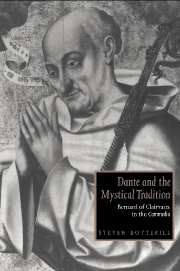Book contents
- Frontmatter
- Contents
- Acknowledgements
- 1 (Re-)reading Dante: an unscientific preface
- PART I READING
- PART II RE-READING
- 4 Bernard in the Trecento commentaries on the Commedia
- 5 Dante, Bernard, and the Virgin Mary
- 6 From deificari to trasumanar? Dante's Paradiso and Bernard's De diligendo Deo
- 7 Eloquence – and its limits
- Bibliography
- Index
- CAMBRIDGE STUDIES IN MEDIEVAL LITERATURE
5 - Dante, Bernard, and the Virgin Mary
Published online by Cambridge University Press: 15 January 2010
- Frontmatter
- Contents
- Acknowledgements
- 1 (Re-)reading Dante: an unscientific preface
- PART I READING
- PART II RE-READING
- 4 Bernard in the Trecento commentaries on the Commedia
- 5 Dante, Bernard, and the Virgin Mary
- 6 From deificari to trasumanar? Dante's Paradiso and Bernard's De diligendo Deo
- 7 Eloquence – and its limits
- Bibliography
- Index
- CAMBRIDGE STUDIES IN MEDIEVAL LITERATURE
Summary
Although, as we have just seen, the attempt to explain Dante's choice of Bernard of Clairvaux as substitute for Beatrice begins with the very earliest commentators on the Commedia, they and all their successors face the same difficulty: the paucity of relevant textual material on which to base their analyses. Outside Paradiso XXXI–XXXIII, in fact, only one reference to Bernard appears anywhere in the corpus ascribed to Dante; and the reason for what will seem to some an overly cautious turn of phrase is that this unique reference occurs in the Letter to Can Grande (Epistolae, XIII), whose Dantean paternity has been the object of increasingly frequent – and increasingly persuasive – attacks in recent years.
If the Can Grande letter is ‘genuine’, as the rhetoric of disputed authorship would have it, its mention of Bernard (Ep., XIII. 80) would show that Dante respected him as an authority in the field of contemplative theology, on a par with Richard of St Victor and Augustine; and it would strongly suggest (though perhaps not quite prove) that Dante had read De consideratione, which is cited in the Letter on a reading-list of basic mystical texts that also includes Richard's De contemplatione and Augustine's De quantitate animae. If the Letter is not genuine, of course, these things would still be true of some anonymous intellectual of the early 1320s – in itself a useful and worthwhile, though perhaps slightly less glamorous, piece of information.
- Type
- Chapter
- Information
- Dante and the Mystical TraditionBernard of Clairvaux in the Commedia, pp. 148 - 193Publisher: Cambridge University PressPrint publication year: 1994



